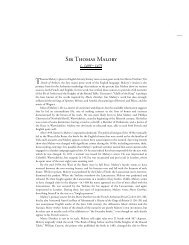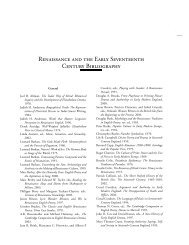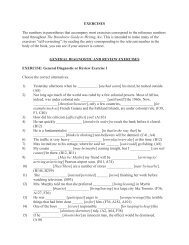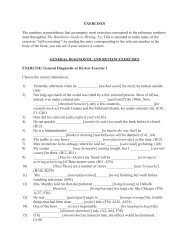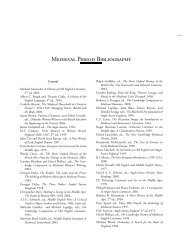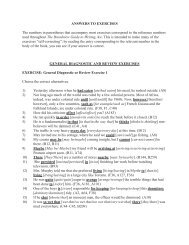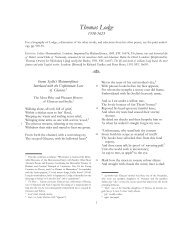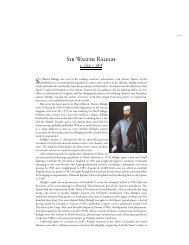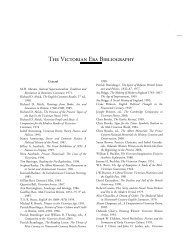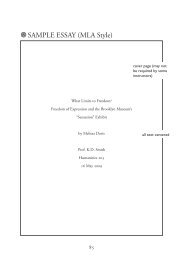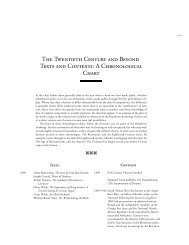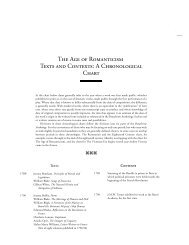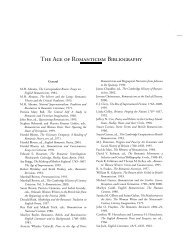Contexts: The Abolition of Slavery - Broadview Press Publisher's Blog
Contexts: The Abolition of Slavery - Broadview Press Publisher's Blog
Contexts: The Abolition of Slavery - Broadview Press Publisher's Blog
Create successful ePaper yourself
Turn your PDF publications into a flip-book with our unique Google optimized e-Paper software.
one boy set to watch in the hot sun till he dropped<br />
down dead. He had been cast away in North America<br />
and had travelled 30 days among the Indians where he<br />
had been well treated. He had twice swum from a king’s<br />
ship in the night & escaped, he said he would rather be<br />
in hell than be pressed. 1 He was now going to wait in<br />
England to appear against Captain Maxwell—“Oh he’s<br />
a rascal, sir, he ought to be put in the papers!” <strong>The</strong> poor<br />
man had not been in bed since Friday night—he left<br />
Liverpool at 2 o’clock on Saturday morning. He had<br />
called at a farm house to beg victuals and had been<br />
refused. <strong>The</strong> woman said she would give him nothing—“Won’t<br />
you? <strong>The</strong>n I can’t help it.” He was excessively<br />
like my brother John.<br />
from Thomas Clarkson, <strong>The</strong> History <strong>of</strong> the Rise,<br />
Progress and Accomplishment <strong>of</strong> the <strong>Abolition</strong> <strong>of</strong><br />
the African Slave Trade (1808)<br />
In 1785, Clarkson (1760–1846) was the author <strong>of</strong><br />
a prize-winning essay at Cambridge University on<br />
“slavery and commerce <strong>of</strong> the human species,<br />
particularly the African.” <strong>The</strong>reafter he devoted<br />
enormous energy to the abolitionist cause. He<br />
played a leading role in founding the Society for the<br />
<strong>Abolition</strong> <strong>of</strong> the Slave Trade in 1787, and in pressing<br />
for the abolition <strong>of</strong> slavery itself after the halting<br />
<strong>of</strong> the slave trade in 1807.<br />
Let us examine the state <strong>of</strong> the unhappy Africans,<br />
reduced to slavery in this manner, while on board<br />
the vessels, which are to convey them across the ocean to<br />
other lands. And here I must observe at once, that, as far<br />
as this part <strong>of</strong> the evil is concerned, I am at a loss to<br />
describe it. Where shall I find words to express properly<br />
their sorrow, as arising from the reflection <strong>of</strong> being<br />
parted for ever from their friends, their relatives, and<br />
their country? Where shall I find language to paint in<br />
appropriate colours the horror <strong>of</strong> mind brought on by<br />
thoughts <strong>of</strong> their future unknown destination, <strong>of</strong> which<br />
they can augur nothing but misery from all that they<br />
have yet seen? How shall I make known their situation,<br />
1 pressed Forced into naval service. “<strong>Press</strong> gangs” were authorized<br />
to force men into the navy at this period.<br />
<strong>The</strong> <strong>Abolition</strong> <strong>of</strong> <strong>Slavery</strong> 17<br />
while labouring under painful disease, or while struggling<br />
in the suffocating holds <strong>of</strong> their prisons, like<br />
animals inclosed in an exhausted receiver? How shall I<br />
describe their feelings as exposed to all the personal<br />
indignities, which lawless appetite or brutal passion may<br />
suggest? How shall I exhibit their sufferings as determining<br />
to refuse sustenance and die, or as resolving to break<br />
their chains, and, disdaining to live as slaves, to punish<br />
their oppressors? How shall I give an idea <strong>of</strong> their agony,<br />
when under various punishments and tortures for their<br />
reputed crimes? Indeed every part <strong>of</strong> this subject defies<br />
my powers, and I must therefore satisfy myself and the<br />
reader with a general representation, or in the words <strong>of</strong><br />
a celebrated member <strong>of</strong> Parliament, that “Never was so<br />
much human suffering condensed in so small a space.”<br />
I now come to the evil, as it has been proved to arise<br />
in the third case; or to consider the situation <strong>of</strong> the<br />
unhappy victims <strong>of</strong> the trade, when their painful<br />
voyages are over, or after they have been landed upon<br />
their destined shores. And here we are to view them first<br />
under the degrading light <strong>of</strong> cattle. We are to see them<br />
examined, handled, selected, separated, and sold. Alas!<br />
relatives are separated from relatives, as if, like cattle,<br />
they had no rational intellect, no power <strong>of</strong> feeling the<br />
nearness <strong>of</strong> relationship, nor sense <strong>of</strong> the duties belonging<br />
to the ties <strong>of</strong> life! We are next to see them labouring,<br />
and this for the benefit <strong>of</strong> those, to whom they are<br />
under no obligation, by any law either natural or divine,<br />
to obey. We are to see them, if refusing the commands<br />
<strong>of</strong> their purchasers, however weary, or feeble, or indisposed,<br />
subject to corporal punishments, and, if forcibly<br />
resisting them, to death. We are to see them in a state <strong>of</strong><br />
general degradation and misery. <strong>The</strong> knowledge, which<br />
their oppressors have <strong>of</strong> their own crime in having<br />
violated the rights <strong>of</strong> nature, and <strong>of</strong> the disposition <strong>of</strong><br />
the injured to seek all opportunities <strong>of</strong> revenge, produces<br />
a fear, which dictates to them the necessity <strong>of</strong> a<br />
system <strong>of</strong> treatment by which they shall keep up a wide<br />
distinction between the two, and by which the noble<br />
feelings <strong>of</strong> the latter shall be kept down, and their spirits<br />
broken. We are to see them again subject to individual<br />
persecution, as anger, or malice, or any bad passion may<br />
suggest. Hence the whip—the chain—the iron-collar.<br />
Hence the various modes <strong>of</strong> private torture, <strong>of</strong> which so<br />
many accounts have been truly given. Nor can such



